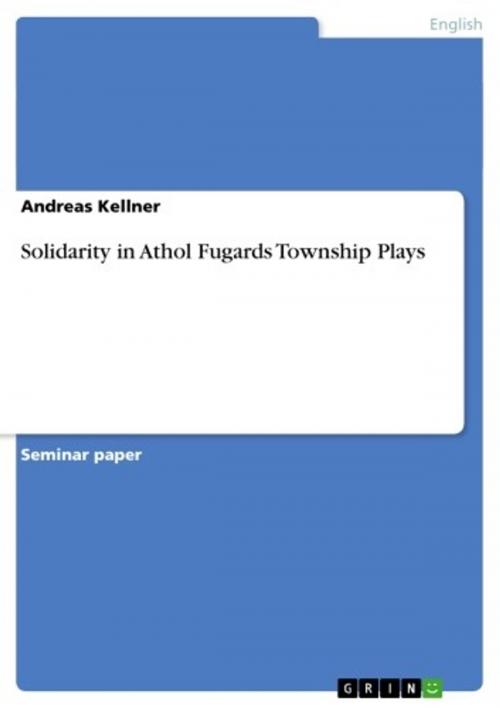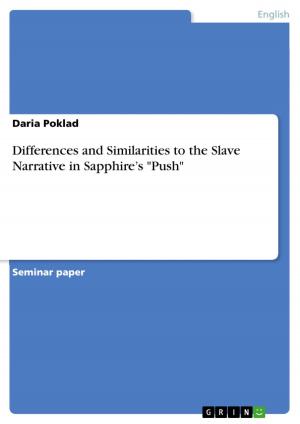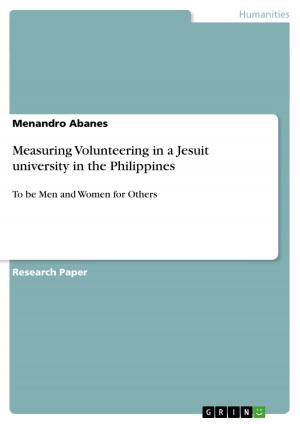Solidarity in Athol Fugards Township Plays
Fiction & Literature, Literary Theory & Criticism, British| Author: | Andreas Kellner | ISBN: | 9783638265362 |
| Publisher: | GRIN Publishing | Publication: | April 3, 2004 |
| Imprint: | GRIN Publishing | Language: | English |
| Author: | Andreas Kellner |
| ISBN: | 9783638265362 |
| Publisher: | GRIN Publishing |
| Publication: | April 3, 2004 |
| Imprint: | GRIN Publishing |
| Language: | English |
Seminar paper from the year 2003 in the subject English Language and Literature Studies - Literature, grade: Good, University of Münster (English Seminar), course: Advanced Seminar: Literature from Southern Africa, language: English, abstract: At the moment solidarity is of topical interest more than ever. In the news we hear of the decline of the welfare state, of cuts in social services. We discuss about our solidarity with the United States of America with regard to the war in Iraq. There are shows on television to collect money for poor countries in the third world or for post-war reconstruction. These are all forms of solidarity. But what really is solidarity? This paper wants to have a closer look at the term 'solidarity', its nuances and its conditions. Solidarity depends on the society and on the time. As an example I would like to examine the term on the basis of Athol Fugard's Township Plays. The Township Plays are: No-good Friday (1958), Nongogo (1959), The Coat (1966), Sizwe Bansi is Dead (1972) and The Island (1973). These five plays were written under the conditions of the oppressive apartheid system which characterized South Africa's politics since 1948. During the following years the Whites oppressed the Blacks in a very cruel way, cut back their rights and made them live and die under miserable circumstances. In such an inhumane situation solidarity grows very fast and reaches its peak. I would now like to examine how solidarity is described in the five South African plays, in which situations it occurs. Furthermore, it may be interesting to look who acts in solidarity with whom and in which situations there is perhaps even a lack of solidarity. These shall be the main aspects of my paper.
Seminar paper from the year 2003 in the subject English Language and Literature Studies - Literature, grade: Good, University of Münster (English Seminar), course: Advanced Seminar: Literature from Southern Africa, language: English, abstract: At the moment solidarity is of topical interest more than ever. In the news we hear of the decline of the welfare state, of cuts in social services. We discuss about our solidarity with the United States of America with regard to the war in Iraq. There are shows on television to collect money for poor countries in the third world or for post-war reconstruction. These are all forms of solidarity. But what really is solidarity? This paper wants to have a closer look at the term 'solidarity', its nuances and its conditions. Solidarity depends on the society and on the time. As an example I would like to examine the term on the basis of Athol Fugard's Township Plays. The Township Plays are: No-good Friday (1958), Nongogo (1959), The Coat (1966), Sizwe Bansi is Dead (1972) and The Island (1973). These five plays were written under the conditions of the oppressive apartheid system which characterized South Africa's politics since 1948. During the following years the Whites oppressed the Blacks in a very cruel way, cut back their rights and made them live and die under miserable circumstances. In such an inhumane situation solidarity grows very fast and reaches its peak. I would now like to examine how solidarity is described in the five South African plays, in which situations it occurs. Furthermore, it may be interesting to look who acts in solidarity with whom and in which situations there is perhaps even a lack of solidarity. These shall be the main aspects of my paper.















